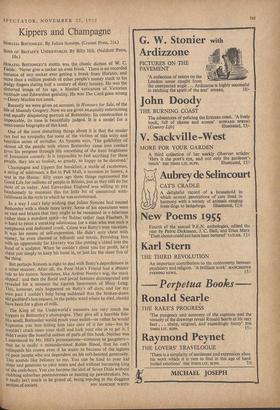Kippers and Champagne
HORATIO BorroMLEY. By Julian Symons. (Cresset Press, 21s.)
HORATIO BOTTOMLEY'S motto was the classic dictum of W. C. Fields : 'Never give a sucker an even break.' There is no recorded instance of any sucker ever getting a break from Horatio, and more than a million pounds of other people's money stuck to his pudgy fingers during half a century of dizzy larceny. He was the distorted image of his age, a bloated caricature of Victorian rectitude and Edwardian geniality. He was The Card gone wrong —Denry Machin run amok.
Recently we were given an account, in Honours for Sale, of the life of Maundy Gregory. Now we are given an,equally entertaining and equally disquieting portrait of Bottomley. Its construction is impeccable, its tone is beautifully judged. It is a model for a serio-comic biography of this kind.
One of the most disturbing things about it is that the reader can feel no sympathy for most of the victims of this witty and heartless series of swindles. As Symons says, 'The gullibility of almost all the people with whom Bottomley came into contact gives his progress through life something of the hard brightness of Jonsonian comedy. It is impossible to feel anything for these People, they are so foolish, so greedy, so happy to be deceived.'
Champagne and kippers for breakfast, a stable of racehorses, a string of mistresses, a flat in Pall Mall, a mansion in Sussex, a seat in the House : fifty years ago these things represented the Good Life for millions of people in Britain, just as they still do for most of us today. And Edwardian England was willing to pay handsomely to maintain this fat little bit of communal wish- fulfilment in the style to which he was accustomed.
In a way I can't help wishing that Julian Symons had treated Bottomley with a shade more levity. Some of his operations were so vast and brazen that they ought to be recounted in a hilarious rather than a mordant spirit—by Balzac rather than Flaubert. It is hard to resist a sneaking admiration for a man who was such a sumptuous and dedicated crook. Crime was Botty's true vocation. It was his means of self-expression. He didn't only cheat with money, he even cheated at billiards and tennis. Providing him with an opportunity for knavery was like putting a chisel into the hand of a sculptor. When he couldn't cheat you for profit, he'd cheat you simply to keep his hand in, or just for the sheer fun of the thing.
But perhaps Symons is right to deal with Botty's depredations in a sober manner. After all, the Poor Man's Friend had a stnister side to his nature. Sometimes, like Arthur Norris's wig, the mask slipped : and then the florid and jovial features disintegrated and revealed for a moment the tigerish lineaments of Huey Long. This, however, only happened on Botty's off days, and for my own part I couldn't help being saddened that the broken-down old gaolbird's last request, in the public ward where he died, should have been for a glass of milk.
The King of the Underworld's memoirs are very much the kippers to Bottomley's champagne. They give off a horrible fish- like smell. Bottomley would pinch your wallet—or rather he would hypnotise you into letting him take care of it for you—but he Wouldn't crack open your skull and kick your ribs in to get it. I didn't enjoy the boastful sadism of parts of this book. Neither was I convinced by Mr. Hill's protestations—common to gangsters— that he is really a misunderstood Robin Hood, that he can't relinquish his crown even if he wants to because of the legions of poor people who are dependent on his soft-hearted generosity. This sounds like boloney to me. You can be kind to your kid sister and generous to your mum and dad without becoming king. of the cosh-boys. You can become the idol of Seven Dials without clubbing suburban postmistresses or beating up pawnbrokers. No, it really isn't much to be proud of, being top-dog in the doggiest


























































 Previous page
Previous page